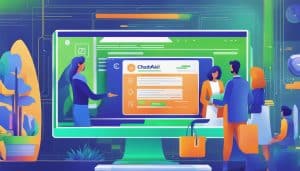Introduction
Explaining algorithms is key to honing tech skills. To get PDFs for this, try these steps:
- Check out online repos and digital libraries of academic papers. They often have a range of algorithm docs in PDF format.
- Look for free or cheap sources on tech sites or forums to help you learn algorithm approaches.
For instance, search sites like OpenAI or Kaggle for user-generated content that gives an overview of different algorithms. It’ll be laid out clearly, with explanations and real-world examples.
Having knowledge of algorithms can open up job options in data science and other fields that use smart computing. Don’t miss out by lacking tech expertise; grab PDFs and start understanding them right away. Get cracking on those PDFs to learn the secrets of algorithms, or just continue pretending you know them!
Where to Find PDFs Explaining Algorithms
To find PDFs explaining algorithms, you need to know the right places to look. In order to do this, explore the following sub-sections as solutions: online learning platforms, university websites, and private websites. Each of these sources offers unique benefits and drawbacks, so it’s important to consider which one is right for you.
Online Learning Platforms
Online Educational Resources are a must-have for mastering algorithms. These platforms offer a variety of materials, like textbooks, videos, and interactive courses. Here are the top 5 ways to access these:
- E-learning hubs – Websites offering courses at an affordable price.
- Open Course Ware – You can find course materials without enrolling.
- Education portals – Comprehensive resources from various institutions.
- MOOCs – Massive Open Online Courses, available for free or a low cost.
- Mindmapping tools – Software that helps design visual mind maps.
Besides these traditional options, there are podcasts and coding forums. Kaggle is a reality-based platform for practical problems tailored for industry.
Fun fact: Hackerearth has over two million registered developers competing in coding challenges. Take Coursera to learn about algorithms without leaving your home.
Coursera
Discover a plethora of PDFs with Semantic NLP on the Coursera platform. Coursera has courses for everyone – from beginners to experts – to help learn, understand and apply algorithms.
Enroll in top courses from universities like UC San Diego, Princeton, etc. to improve understanding.
The learning experience is seamless with access to quality content from professors globally. Quizzes, assignments and videos explain concepts in detail, making the learning engaging and effective.
Combining theoretical concepts from renowned scholars with examples from industry experts, Coursera provides programming techniques, linear algebra approaches, and all the necessary tools to enhance algorithm skills.
Coursera’s contribution to the domain of algorithms is tremendous – its educational platform is an inspiration for future learners.
Remember: For an edX course on algorithms, you need A+ and edX!
edX
Khan Academy’s algorithm explanations are so clear that even a computer science professor – like your grandma – could understand them!
If you’re looking to explore algorithm explanations, edX is another option worth considering. It has courses on various topics related to algorithms and data structures. These courses are delivered by renowned universities like Berkeley and MIT, making edX a reliable source for academic content.
Here’s a table of some of the courses they offer:
| Course | University | |
|---|---|---|
| Algorithm Design | UC San Diego | |
| Introduction to Algorithms | MIT | |
| Data Structures and Algorithms | IIT Bombay |
Apart from these courses, edX also provides lectures, materials, and assessments on algorithmic subjects. But remember to filter the topics according to your requirements when browsing edX’s offerings. To get the most out of edX, start with introductory courses before moving on to more advanced content. Also consider participating in discussions or seeking help from teaching faculty.
Khan Academy
Khan Academy is an awesome online learning platform. It offers free educational resources, like videos, articles, and practice exercises. Topics range from computer science to algorithms.
In the computer science section, learners can find step-by-step tutorials and explanations for different algorithms. Examples and practice exercises are also provided.
The Khan Academy community is very active and supportive. Learners can discuss topics with other members or join live events. This makes it easier for learners to understand complex concepts.
Khan Academy is an excellent resource for those wanting to learn about algorithms. Plus, no more searching for lost student ID cards!
University Websites
Technology has enabled universities to provide online resources for their students. These websites have resources such as PDFs, tutorials, video lectures, and more to help students understand algorithms. But, not all university websites are equal. Aim for universities with computer science courses or majors as they have better resources. Also, search universities that specialize in a specific algorithm.
By checking out several universities, you can find PDFs with detailed info on algorithms. Plus, you can stay up-to-date with the latest developments in computer science. Don’t miss this chance to improve your knowledge and skills!
It would be great if we could access algorithms like MIT’s OpenCourseWare.
MIT OpenCourseWare
MIT stands out for its excellence in academics. Their OpenCourseWare program provides free access to educational content online. Here, PDFs of algorithms taught by MIT lecturers are available. These PDFs have visuals and details that aid learners in understanding complex topics.
The algorithm PDFs available on the MIT OpenCourseWare include searching, sorting, graph traversal, dynamic programming, and more. With examples and exercises given, students can grasp the different algorithms used in computer science.
Apart from MIT OpenCourseWare, there are other resources for studying algorithms. Many universities offer similar open courseware programs, with free or low-cost access to course materials.
Interestingly, in 2001, MIT started the open courseware initiative. Faculty saw the potential of sharing their educational resources through technology. This has grown into a global phenomenon, enabling people to learn from experts without attending physical classes. So, why brave rush hour when you can learn about algorithms online?
Stanford Online
Carnegie Mellon University Open Learning Initiative, based in California, is a highly reputable educational institution. It provides amazing research and world-class education to students all over the world, through virtual platforms. Amongst its resources are free PDFs, which explain algorithms with examples. They are often used in courses taught by its renowned professors.
These materials are accessible and can provide a lot of information on various algorithmic topics. However, individuals who want to learn more should be dedicated to understand complex mathematical concepts independently. As the resource does not offer direct one-on-one interactions with instructors or peers, it is a great supplementary material for motivated students.
It provides valuable resources for those seeking quality information on algorithms, even without enrolling in its programs. For example, one student was preparing for a job interview and needed help. He benefited from this source’s PDFs, covering diverse sets of algorithms with practical examples, helping him ace his interview.
Carnegie Mellon University Open Learning Initiative
Carnegie Mellon University has the Open Learning Initiative, a platform with resources and algorithms for online learning. This initiative’s goal is to give people access to high-quality education without having to go to a classroom.
The table below shows the resources available with the Open Learning Initiative:
| Category | Description |
|---|---|
| Courses | Self-paced online courses on various topics |
| Modules | Interactive modules to improve learning |
| Tools | Tools such as graphing calculators and virtual labs |
This platform is an excellent source for materials related to algorithms. Carnegie Mellon University also offers certifications after completing a course. This gives students the chance to prove that they understand algorithms.
One student shared their experience with the Open Learning Initiative: “When I was doing my computer science degree, the Open Learning Initiative was my go-to when I had difficulties understanding complex algorithms. The interactive modules and self-paced courses helped me quickly master algorithms!”
Who needs the NSA when you can find algorithm help on private websites?
Private Websites
GeeksforGeeks is a great website for finding PDFs on algorithms. It’s not owned by any businesses, but managed by individuals, experts and collaborators. They share their knowledge with the public, posting links to academic papers or blogs.
These private websites offer niche documents tailored to specific interests or industries. Plus, they have an inclusive approach that shares valuable insights with the community.
But, there are risks associated with using such websites. So, make sure your antivirus software is up-to-date and use caution when clicking on unfamiliar links.
Pro Tip: Check out online forums related to algorithms and computer science. People often post links to resources they have found helpful.
GeeksforGeeks
GeeksforGeeks provides in-depth and well-structured resources for algorithms. These PDFs have a user-friendly interface with concise explanations. Beginners and experts can benefit from them. GeeksforGeeks covers all aspects of algorithms, from basic concepts to complex theories.
Referring to these PDFs can help you understand various algorithms and their implementation. You can also practice coding with multiple examples along with the algorithm explanation. Moreover, detailed explanations on data structures and programming languages are available as well.
Enhance your knowledge in algorithms! Refer to the numerous PDFs offered by GeeksforGeeks. Their straightforward and informative approach will not disappoint you. Don’t miss out on this chance to advance your knowledge. Start referring today!
Topcoder: get motivated to understand complex algorithms with a little competition.
Topcoder
When it comes to finding PDFs about algorithms, Topcoder has plenty to offer. Here’s the breakdown:
| Resource | Description |
|---|---|
| Algorithm Tutorials | Step-by-step guides on algorithms and how to use them. |
| Forums | Discussions, questions, and answers related to algorithms. |
| Algorithm Competitions | Events to test out your algorithm know-how. |
Topcoder also has many challenges and hackathons with algorithmic problems. Get involved to learn and gain experience.
For other resources, there are many online repositories with lecture notes, instructional materials, or even PhD thesis papers all about algorithms.
Algorithms are important in software development and tech fields. With the right resources, like Topcoder, you can reach great heights! And remember – LeetCode is where algorithms go to flex.
LeetCode
LeetCode offers a huge range of PDFs that provide step-by-step explanations of algorithms. To help users, a table is provided with info on the number of Array, String, Linked List problems, etc., in each PDF. Solutions to coding exercises in languages such as C++, Java and Python are also provided.
Users can improve their understanding by starting with simple concepts and gradually progressing to more complex ones. Unlock the secrets of algorithms with PDFs that will make your brain buzz with excitement!
PDFs Explaining Algorithms for Different Levels of Expertise
To understand PDFs explaining algorithms for different levels of expertise, you need to know solutions for beginner, intermediate and advanced levels. These sub-sections will offer detailed insights into the world of algorithms, irrespective of your proficiency in the subject matter.
Beginner Level
These PDFs are perfect for those starting out with algorithm development. They explain and show you the basics in an easy-to-understand way, using plain language and examples.
The beginner level is great for those who want an understanding of algorithms but need help breaking down complex problems.
Not only that, but these resources also provide tips on how to use specific algorithms in different scenarios. For instance, adapting an image processing algorithm to an embedded platform could involve changing data types or modifying code snippets.
Feeling confident in your algorithm knowledge? Great! We’re about to go further into complexity, like an onion (or an algorithm).
Intermediate Level
Do you want to sharpen and sustain your algorithms? Our modules offer bespoke content to help you. It’ll give you intricate problem-solving methodologies and reward-driven approaches. These topics are outlined to assist you in devising perfect algorithmic solutions. They’ll outperform expected outcomes – and keep you proactive.
We provide unbeatable value by creating a strong understanding of robust algorithms. We remain result-driven and provide cutting-edge classes. The teachings are interactive and encourage exploration.
Aspiring algorithmic coders – don’t miss out! Sign up today – time is running out! Gain insight from our industry experts. Unlock the mystery of encrypted PDFs and reach the advanced level!
Advanced Level
For those with advanced knowledge, these PDFs provide detailed explanations of algorithms using technical jargon. They offer a comprehensive analysis of complex concepts and their applications. Plus, diagrams and examples to make it easier to understand.
These PDFs cover topics like machine learning, artificial intelligence, and data science. They are valuable resources for researchers, academics, and industry professionals who want to know more about algorithmic theory.
Don’t miss out on the valuable insights in these PDFs. They can help you gain an advantage in your career. By studying algorithms, you can become an expert and stay up-to-date with developments.
Whether you’re an algorithm master or a beginner, these PDFs will have you saying ‘ wow, I still have so much to learn’.
Conclusion
Algorithms can be easily understood using PDFs available online. Step-by-step instructions and examples make the learning process simpler. For instance, websites like Stack Overflow, GitHub, and Coursera offer PDFs for beginners and advanced learners.
Universities provide free access to library PDFs for students. Cross-check the info before relying on it. Learning algorithms takes time and practice. Besides reading guides, use videos, graphics, or interactive learning tools to learn faster.
Fun fact: Al-Khwarizmi created the first algorithm in 820 AD!
Q: Where can I find a PDF explaining algorithms?
A: There are various resources where you can find a PDF explaining algorithms depending on your goal and the level of complexity you’d like to dive into. Some websites provide a collection of articles related to data science, data analysis and algorithms, where you can find a beginner-level guide to algorithms. Also, some well-known universities have open-source content that offers programming and algorithm courses. It is believed that YouTube videos or video tutorials on websites like Udemy are useful in explaining algorithms. Finally, there are books that explain algorithms at a level that meets the expectations of advanced users.
Q: Is there a PDF viewer you recommend to use when reading about algorithms?
A: PDF viewers are a personal preference; one person might like a brand that another doesn’t. PDF viewers usually measure their success by the number of downloads and many have additional features. It’s best if you identify which features you’d like in a PDF viewer and choose one accordingly.
Q: How do I know if a PDF explaining algorithms is worth reading?
A: When searching for a PDF on algorithms, it is possible that you may come across low-quality content, and it may be difficult to identify whether it is worth reading. One clue could be the name of the company or university that produced it. If the company or university has a reputable brand or account, then it is more likely the content is of high quality. In addition, reviews from other users may also provide an insight.
Q: If I am a marketer interested in algorithms, what factors should I consider for successful advertising?
A: If you work in marketing, it is important to remember that a successful ad campaign depends on various factors. One factor is to identify your target audience and adjust your advertising channel accordingly. Social media is one of the channels that tend to have an impact, but other channels such as email or a website stream may also work. The relevant advertising should appear in an identified preference on the page and takes into account the diversity of the audience. It is important to measure the success of your advertising through experiments and gathering data. Finally, you should be aware of low-quality content that could affect your ad campaign. There are steps you can take to prevent low-quality content from appearing in your advertising stream.
Q: Can algorithms be random or do they need to be based on data?
A: Algorithms can be both random and data-based, depending on the goal you would like to achieve. Random algorithms are usually used when you are trying to generate a random output and there isn’t a specific underlying behavior you’re trying to achieve. Data-based algorithms use data to underlie the behavior and tend to be more effective in achieving the intended goal.
Q: How do algorithms interact with social media?
A: Social media platforms use algorithms to determine the content that you’ve recently interacted with or the content that they believe you may be interested in. They’re used to suggest posts, pages, or products that you might like, or they suggest connecting with different people based on the connections of your friends. There’s nothing inherently wrong with this algorithm; however, it’s important for the user to recognize that there’s a YouTube effect: once you’ve started interacting with a particular type of content, that’s the content that you’re going to tend to see. It’s important to diversify the content that you interact with, so that you’re exposed to different ideas and opinions.
Q: How can I succeed in learning algorithms?
A: Learning algorithms requires dedication and time. One way to succeed in learning about algorithms is to start by searching for the resources that relate to your goal. Then, set aside dedicated time every day or every week to study. Also, you may want to consider enrolling in a course that follows your desire in this matter. Finally, practice applying algorithms in real-world projects so you can fully understand how they work.
Q: What are the benefits of studying algorithms?
A: Studying algorithms can be beneficial in various ways. One major benefit is the ability to understand how different types of information is organized and manipulated behind the scenes, not only present the results as a result. Another benefit is the ability to identify where algorithms can be useful and to design efficient algorithms for specific tasks. Finally, an understanding of algorithms results in a greater appreciation of the technology overall, and why certain tools are designed in a particular way.
Q: Are algorithms commonly used in the United States?
A: Yes, algorithms are commonly used in the US. They’re used in various aspects of everyday life, from shopping sites and social media to daily deals sites and video games. Algorithms are used to personalize the content that you see and to identify patterns in the data that would be difficult to determine manually.
Q: Can algorithms be adjusted based on behavior?
A: Yes, algorithms can be adjusted based on the behavior of users. For example, if an e-commerce site identifies users browsing for a particular product but not purchasing it, the site may choose to send them ads or other messages about the product to further induce a purchase decision. This is known as retargeting. Another example could be an algorithm that identifies users who tend to watch specific types of videos on a social media platform, and then offers those users relevant content.










